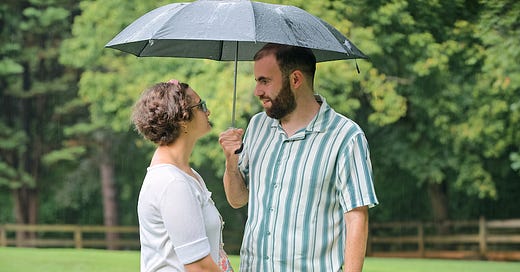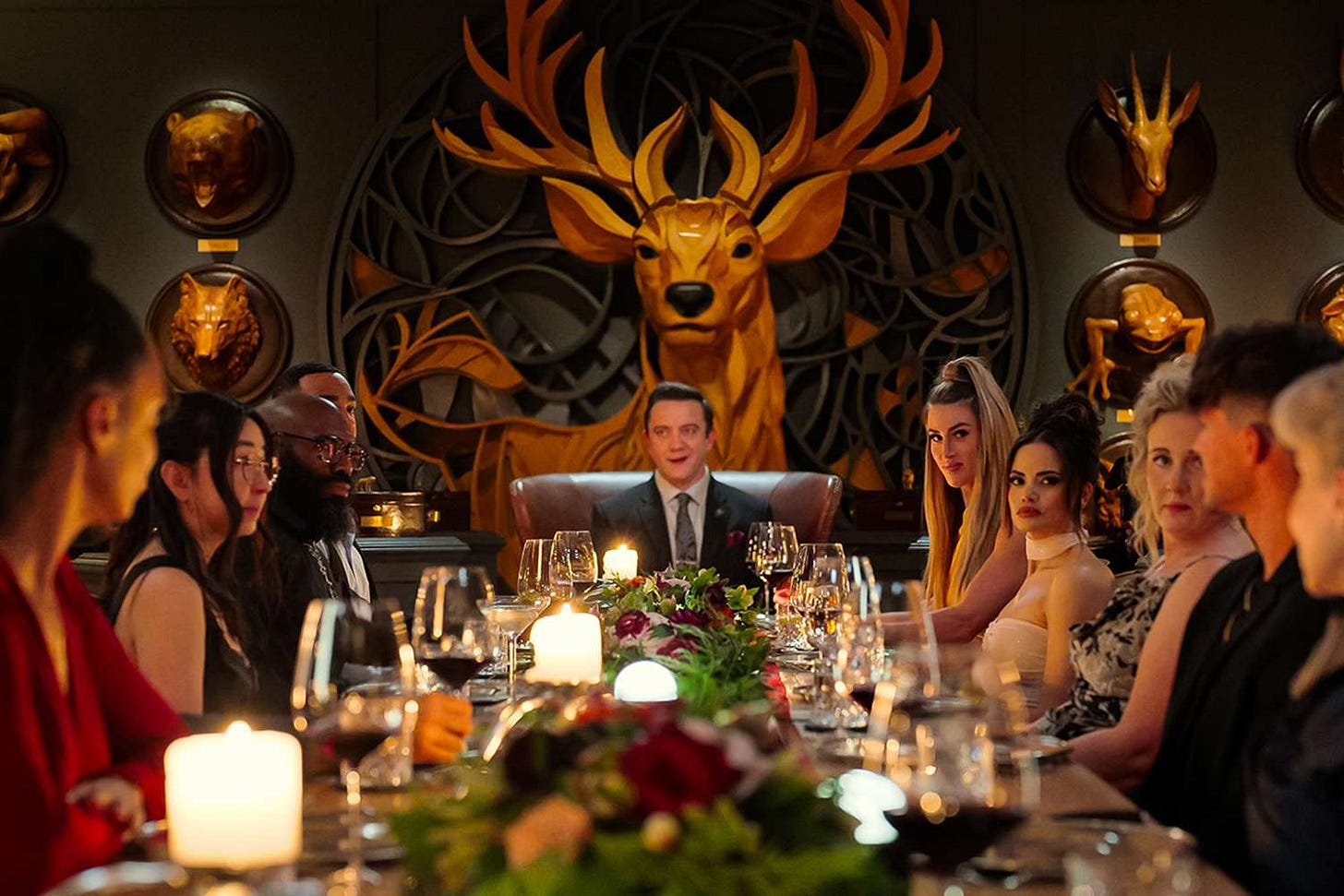Let’s get this out of the way first: I’ve never watched The Traitors.
Not because I consider myself superior to people who watch reality shows -even though they try to pass for something different- but because I haven’t owned a tv set nor a tv licence for the past seven years. So in the one occasion I did have access to a television and paid-for coverage for a few days, I spent my time binge watching Fleabag and Normal People. I regret nothing.
However, if the circumstances put me in a position where a reality tv show is accessible without barriers to entry, say on Netflix, the only streaming platform I subscribe to, then chances of me watching it increase exponentially. Cue to Million Dollar Secret which apparently is a knockoff of The Traitors with just about the bare minimum changes to avoid copyright infrengement. I have no proofs (because I haven’t seen The Traitors, remember) but also no doubts because streaming platforms will latch on to whatever works as fast as possible and churn out a copy to capitalise on it while people are still interested.
Before you roll your eyes at the prospect of having to read an entry on a reality show you probably haven’t watched or plan to, I’d like to reassure you that this won’t be the case. Or not exactly.
I’m more interested in the people dynamics of these formats which despite being hardly new to anyone who remembers the first edition of Big Brother in their native country (another copy and paste global hit from The Netherlands to the world) are still fascinating and gripping. This is particularly impressive after all these years considering we now know we are watching a highly edited product where maybe most of the interactions are somehow fabricated and assisted by a script and where contestants have been chosen for having very specific profiles that lean more towards drama queens than zen monks.
Despite being aware of the above, since I haven’t watched reality tv in a very long time, I was a bit in the dark about what Million Dollar Secret could be about but the mystery was solved in the first 5 minutes: a group of 12 strangers, all quite at ease in front of a camera (a giveaway sign of their extroverted nature), gathers at a luxurious villa where they’ll have the opportunity to win one million dollars if they play their cards right and a) manage to keep from the others they’re the ones with the money, which is deposited on a box assigned to them on arrival or b) manage to find out the secret millionaire among them.
The action takes place in a breathtaking setting in the middle of nature that at first I thought was somewhere in Europe but once I realised all the participants were from North America (which took a minute despite the mention of a million dollars and not pounds), I assumed must be somewhere in the US. Oh well, it was a bit disappointing as North Americans are too theatrical and self-aware for my taste in reality tv contests but I guess that’s what you get when you pay for a knockoff.
The only British nod to The Traitors is the host: Peter Serafinowicz, who I quite like and who has a short but very impactful role on another Netflix hit, The Gentlemen. I hope he gets a bit more of screen time if there’s a second series. Right from the start Serafinowicz warns everyone to look for “odd behaviour” that may be linked to the millionaire’s secret agenda to win an advantage over the other guests and here’s where I get confirmation that I could never be a good contestant in a show like this and I’d probably be out on day one because as an introvert I’ve learned that minding my own business in peace and quiet and trying to survive another day is often regarded as odd by a great number of people who turn out to be extroverts.
As I said before it took me a bit to realise this was Netflix’s US version of a popular British show and in fact I thought it strange how these people spoke. Then when everyone started saying where they were from I was shocked there were so many Americans because what are the odds? That’s how bad I am at accents and how little I understood of what was going on in the first few minutes. So I’d be fucked if I were the secret millionaire and my task to win an advantage consisted on spotting English accents. There I’d be wondering where in the UK people spoke with such American-sounding accents and asking random questions to try and pin them down.
“Where in Scotland you said you were from?”
“I said Scottsdale”
“And is that close to Aberdeen by any chance?”
Except that in a show like this that’d be my downfall because in reality tv shows 1) everyone is a native English speaker who doesn’t encounter this issue because they can spot different accents like I can do with Spanish and 2) any normal human interaction at the most basic level is apparently a clear sign of odd behaviour that can put a target on your back very quickly and it’s mind-blowing how people can create a convoluted scenario in their head out of nothing. So asking people for their name, place of origin or why they sound American when I was sure they were British would immediately make me look like I have a million dollars hidden in my room and start a conspiracy to kick me out. So far, so logical.
Which leads me to question the show premise in itself as the biggest of all oddities. Because let’s be serious for a minute here: a million dollars in this age and time with cost of living, tariffs and what not is pocket money so why are these people so keen to go an a reality show to overanalyse every interaction they have as if they were trying to decipher their situationship’s text messages for less than what a London flat costs? Something doesn’t add up here. If Linda Evangelista didn’t wake up for less than $10,000 a day, I think these people should demand the same adjusted for inflation.
Next is the location.
Can someone please explain how it is not odd that these people are at a place that seems a resort right off Lake Geneva where exiled European royalty would happily agree to retire after a military coup ousted them and which never in a million lifetimes I could afford to travel to, yet the most they manage to say is ‘Oh, this looks nice’ and then proceed to casually strut around to their bedrooms -which are double the size of my flat in London- dressed in what I can only describe as Chanel Spring/Summer Cruise collection? It’s suspicious that most of the contestants could pass as millionaires so casually. I’m aware them being actually rich is not the point of the show but finding out who has received a box with the money; however a lifetime of financial struggles has taught me to distrust luxury and its enablers in any way, shape or form.
Perhaps I’m being a bit obnoxious in my behavioural assessment because I haven’t even given time to the contestants to interact beyond surface level and so far I’ve only got first appearances to judge on. Fair point.
Let’s then move on to the rite of passage of every reality show worth of that name which is the first communal meal. This is usually an opportunity to get a bit of intel on your fellow competitors in a casual, non-chalant way because being convivial is considered fairly standard behaviour in most cultures. Here they all are, seated at the table where a wonderful meal has been served when a lovely chap from Hawaii (never in a million years would I have guessed from the accent but maybe the shirt was a giveaway) suggests they all hold hands before eating because it’s a tradional Hawaiian custom.
And the glance game begins. Wasn’t that odd? everyone asks. Definitely, everyone else agrees. You would be tempted to think these people are about to find a cure to cancer judging by their seriousness and commitment to dissecting a non-event. Meanwhile the poor Hawaiian fellow is blissfully eating his meal without knowing it’ll be his last because apparently holding hands and wishing well to strangers is highly suspcious. Agree with the first but disagree with the second. Aloha, baby.
What has really made the eight episodes of Million Dollar Secret go by in a second is precisely that tried and tested formula where contestants, under the vest of integrity, think themselves above the shitshow splash around them, in some cases initiated by themselves. While this is escapism tv where we get to forget about our problems by watching people playing each other for pocket money, the behaviours and personalities that usually are encouraged to be represented on these programmes are incredibly telling of what we have been tricked into accepting as normal.
As episodes progress, contestants start dropping off their kindness masks and early-stage strategies come to the surface, which is once more quite standard for reality shows. There is always a few people -usually straight white men, apologies in advance to those of you who tick those boxes but couldn’t be further apart from the stereotype- who think they are smarter than the rest and able to provide the leadership that is lacking (or so they have decided) so they appoint themselves into a de facto team leader and convince themselves everyone is on their side when manipulating speaking to others. More normal behaviour reflecting the average state of the world these days.
These men feel so smug about their assured leadership position that they can’t even hide it even if they paid them, which I suspect it is the case because who on earth goes to a reality show out of their goodness of their heart? Odd behaviour if ever there was one. While I bet everyone who is on this show is on Netflix’s payroll, they still have to be half-assed about winning a million dollars, which I insist seems barely enough to cover the psychological treatment they’d need after the show is over and see themselves behaving like a complete prick because no one in their right mind would have thought joining a reality show was a good idea in first place.
The common denominator of a show where being deceptive and manipulative is key to winning (because you have to hide the fact you are the secret millionaire from the others, I remind you) is how everyone, absolutely everyone, hurries to say to the group after the first person has been eliminated that they aren’t going to sacrifice their integrity for playing a game.
And that, dear readers, is actually not odd at all because is what we’ve seen a million times happen before in other reality shows as well as off screen. Morals, or at least the illusion of them, in the distance, becoming smaller and smaller as the stakes get higher. The weird thing, in fact, would be for someone to actually follow through and stick to their word. That’d be a shocker and probably would make for some interesting developments and groundbreaking audiovisual content as honesty is such a rare quality these days that it could throw people off in unexpected ways.
While watching Million Dollar Secret a thought crossed my mind: I’d be very curious to see how the participants of Love on the Spectrum, an Emmy-winner Netflix series that follows people on the autism spectrum in their search for love, would do in this contest. If you haven’t watched it yet, I urge you to do so because this is one of the most hilarious and wholesome series (as are the participants and their families) you’ll come across on any audiovisual platform and the people in it give me hope in humanity with their straightforward, kind, and zero-bullshit attitude and considerate interactions with others and positive representation of autism.
I can’t stop thinking how anyone on Love on the Spectrum would immediately catch the millionaire among the group without much effort. It helps that they are on the autism spectrum and as such they have no tolerance for lies or inaccuracy, so they aren’t afraid to ask for clarification as many times as needed pointing out any incoherences, which I think is bloody amazing. Yet society insist on calling that divergent thinking and labelling it as rude instead of praising it for what it actually is: clear communication skills. If that isn’t odd behaviour… But I digress, and actually I wouldn’t want any of the pure souls of Love on the Spectrum to be subjected to the twisted ways of their neurotypical Netflix guest stars. I fear their logical brains would implode out of frustration at such truly contradictory behaviour.
A weird thing I’ve noticed in Million Dollar Secret is how everyone seems to always have a healthy appetite. I’m not saying people shouldn’t eat on screen when the only reason for them being on such a show in first place is for my entertainment, but how can they eat as if nothing? If I were among them I’d be anxious about a) finding out who the millionaire is, b) not being found out if I were the millionaire, c) fearing someone suspects I am the millionaire when I’m not and wants to kick me out and d) the possibility of becoming the millionaire unexpectedly and then having more problems to worry about.
I wouldn’t manage to send down a single thing with all that anxiety making my stomach go like washing machine on a high revolution spin cycle. But these people seem unfazed by anything. Classic extrovert behaviour, if you ask me. They are eating all the time, and not just snacks or sandwiches, proper sit down meals consisting on several courses. To be honest the food looks absolutely delicious and not eating it would indeed be considered strange and raise suspicions beyond the imaginable for I have yet to meet an adult person who looks forward to deciding what to eat and then cook it three times a day for the rest of their lives.
The best example however of what we’ve come to accept as normal behaviour, and which is often a trademark of reality shows, isn’t how some people manage to keep a poker face while lying through their teeth but the short-lived alliances that form out of the blue and seem unbreakable until a better offer is on the table to oust a strong contestant. This is the moment of truth in which whatever promises someone has made are quickly overriden by the greater good, which in this context means staying in the game and kicking someone else out of it. This is not quite as simple as it seems as reality shows thrive on dramatic twists where the smart players get eventually played to the shock and delight of contestants and viewers alike. That’s why this shit is so addictive, let’s be honest.
Is that constant alliance shifting odd? I’d say yes if we lived in a neurodivergent, logical world ruled by my lovely, no-bullshit, fiercely loyal people of Love on the Spectrum, but unfortunately in the flawed neurotypical society of today where lying is regarded almost as a form of kindness, loyalty lasts the time of a new match on Tinder; and since changing your mind every two seconds making it impossible for others to plan accordingly and then denying it has been my landlady’s modus operandi these past few months, I’d say it’s just pretty standard shitty behaviour, although not necessarily odd. However, take this with a pinch of salt because after years of having been exposed to pre, during and post Brexit political debacle I’m probably desensitised to fuckwattage and my radar is a bit off on this one.
But the definitive and final sign that we’ve been brainwashed into accepting truly odd behaviour for normal is how these people, most of them in their mid thirties, have so much energy to talk to others and want to do things. I had forgotten how exhausting being around extroverts is (even when there is a protective screen between us) and how they seem unable to reflect in silence for two minutes straight. These people are psychopaths and you can’t convince me otherwise because who in their right mind wants to talk first thing in the morning? That’s some weird behaviour going on there.
It takes me three hours from the moment I wake up to the moment I’m able to connect my brain with my mouth and I am able to produce comprehensible sounds. And that’s in normal circumstances, times may increase if I get up earlier. That, of course would be considered extremely odd for the extroverts in a reality tv show and I’d be out before I had time to articulate good morning because these people are yapping and plotting all the fucking time. I am fully aware that’s the only thing they have to do all day (and are paid for, let’s not forget) but it seems excessive to me that someone can speak so much without their mouth self-combusting.
And where do they get the energy? My nervous system is crying for mercy after having spent the last couple of weeks doing more events and meetings than usual which have left me completely drained mentally and physically.
It’s clear that only extroverts are naturally suited for these kind of contests that demand high-energy levels 24/7 to keep the audience engaged. I can’t imagine an introvert a) wanting to talk to strangers or find out anything about them at all for no reason, let alone asking about money, b) spend so much time around said strangers dissecting non-events such as “he seems to breathe a bit too much today, odd”, c) worrying excessively about being caught having the million dollars on account on the previous points, d) having any interest in being on the spotlight/fighting for protagonism if that puts their peace and alone time at risk, and last but not least d) being interested in participating in a reality show or indeed watching one.
Perhaps that’s the problem with the behaviours the contestants in Million Dollar Secret perceive as odd for the benefit of us viewers when engaging in absurd speculation about the fact that someone blinked a little too much after a copious lunch. For the truth is that beyond the obvious need to justify their presence in a show whose only raison d’être is that Netflix is trying to milk as much as it can a copycat of a successful BBC show, extroverts aren’t really the observant type in my experience so that’s probably why they seem perpetually in awe at someone existing at usual. I think it’s time reality shows offered us something truly original for once and came up with a contest where there is no script, secret agendas or loud extroverts in sight (or writing the scripts) flaunting their overpowering personalities and willing to do anything for their 15 minutes of fame.
It could be a disruptive concept where we follow a group of international non-native English speaker introverts with varying degrees of sociability but all very nice and friendly people (given the right circumstances) who have to share the same space and must get to know each other over activities where they have time to talk at length about their respective interests via a series of curated clues to discover what they may have in common.
Since big groups are a no for introverts, one of the goals of the show could be to be able to feel comfortable with everyone eventually, although to guarantee success there should be a maximum of 10 contestants and no eliminations (that would defeat the purpose of bonding) and the participants may need at few months to open up at their pace. This could be encouraged by a couple of group activities every week without making it look like is compulsory to join but always inviting everyone no matter how many times they have declined so they feel included.
The setting would be a lovely house filled with books, beautiful views all around, a few cats and delicious food - if the extroverts can have it why not us? Needless to say there would be plenty of alone time to recharge from social interactions and extra activities they can engage with, inside or outside the house. The winner would be the person who manages to create a small group of friends over common interests who are genuinely happy to meet in person and even initiate plans unprompted after the show is over. I realise now this show suspiciously looks like doing an Erasmus year minus the sex and the house parties where people kept showing up.
Before you burst my bubble and say, “Cristina, who would watch a show where people are nice to each other, respectful, and want to genuinely connect and support each other?” Well, there has to be some normal people left on earth, they can’t all be neurotypical extroverts!
After having devoured three seasons of Love on the Spectrum and seen how screen representation is instrumental in educating people and dismantling prejudices about neurodiversity, I think it’s high time introverts received the same treatment so the world can learn how much fun we can be when we’re given the opportunity to live a quiet life on our own terms where we can dedicate time to our personal interests, engage in meaningful conversations that excite us and allow us to share our passions without a time limit or agenda, something that seems truly odd in these times of short attention spans and quick dopamine hits. Be the change you want to see and all that.
I think it has potential. Besides, I already have a name for it, Dream Life, and I’d be so fucking down with it. I eagerly await a call from Netflix after this post is published to discuss the pilot so I’ll keep you posted on when you can expect to see me on screen. Reading, of course.
Abroad is independent publication about London, living in between cultures, languages, books, music, films, creativity, and being human in the age of artificial intelligence.
If you enjoy my writing, the best way to support it is by liking, commenting and sharing it so the algorithm can inflict my thoughts on a greater number of people, which has been a childhood dream of mine.
If you find yourself here regularly, you can be part of the Abroad journey by subscribing for free to receive updates.










"streaming platforms will latch on to whatever works as fast as possible and churn out a copy to capitalise on it while people are still interested" - I think you're onto something here, Netflix and Amazon Prime as the Zara and H&M of entertainment? They keep churning out these easily digestible content lately - background TV instead of appointment TV. Remember when they were known for the exact opposite? I guess to continue to grow exponentially they needed to cut costs and target the more mainstream audience...
Anyway, I love the idea of your dating show for introverts. In a way it felt a bit like this on The Boyfriend, where everyone was so supportive of each other. It was perhaps more due to the more timid and polite social interactions in Japanese culture than whether they were introverts or extroverts, but it has been shown to work at least as it was a hit show without the drama.